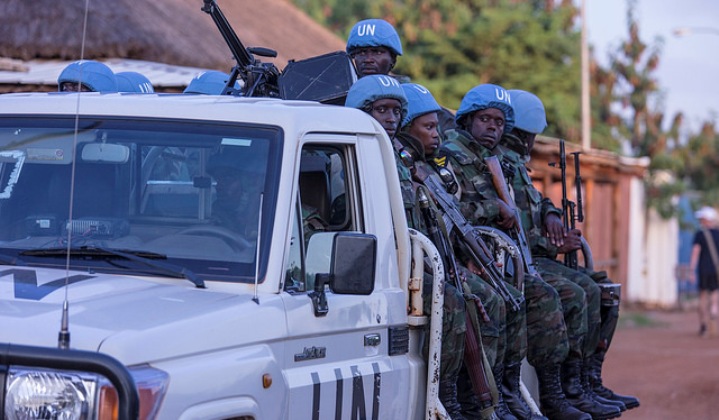S. Sudan accepts participation of neighbouring countries in UN protection force

November 8, 2016 (JUBA)- South Sudanese government has accepted participation of neighbouring countries in a UN mandated regional force, representing a major shift in its earlier position opposing contribution and deployment of troops from countries with which it shares direct borders.
The circumstances under which the government made such an abrupt decision remain unclear. No official explanations were made with the regards to the previous stance on the contribution of troops from neighbouring conuntries.
However, several military and security officers told Sudan Tribune on Tuesday that the initial concerns were due to how some countries were perceived as sympathetic to the cause of armed opposition under the leader of the former First Vice President Riek Machar.
The Chief of General Staff of the Sudan People’s Liberation Army (SPLA), Paul Malong Awan, accepted and welcomed contribution of the countries from the region. General Awan reversed the previous stance of the government during a meeting with Ethiopian military officials about how they could participate in the regional force.
The decision followed a recent visit of the Ethiopian Prime Minister Hailemariam Desalegn to South Sudan capital, Juba, where he struck a deal on bilateral cooperation with the government of President Salva Kiir, including assurance to not support and host armed dissident group operating against either of the regimes.
The Ethiopian prime minister’s visit was later followed by a visit of the chief of general staff to Ethiopia where he had the opportunity to meet and discussed bilateral security matters with security officials. Also, the two sides agreed to upgrade and strengthen their military cooperation.
In a bid to confirm what South Sudan’s army commander had relayed to his Ethiopian counterpart, the top military officers and intelligence officers in the Ethiopian government also visited South Sudan where they were finally assured of the commitment to allow their participation in the regional protection force.
A presidential source on Tuesday said the President has permitted the participation of neighbouring countries because they have now recognised the First Vice President Taban Deng Gai as the legitimate replacement of his predecessor and agreed to not host or support armed dissident groups operating against the Transitional Government of National Unity.
“There was a fear that troops coming from countries with direct border with us were going to take side in favour of the SPLM-IO led by Riek Machar as part of the regime change agenda. But now it is clear, given the ways things are happening these days,” a presidential source told Sudan Tribune on Tuesday.
“The political environment appears to be changing because these countries seem to have now understood the position of the government on a number of issues. So there is no reason to reject their contribution as long as they stand their position of the government and their role in the protection force,” he stressed.
Meanwhile Santo Domic, a SPLA Deputy Spokesperson said that Chief of General Staff Gen. Paul Malong discussed the matter with the Ethiopian officials and agreed they participate in the deployment.
The discussion, he said, centred on the deployment of the protection force and implementation of the country’s peace agreement.
Awan, according to Dominic, stressed that South Sudan is not against the participation of any troops from the neighbouring countries in the regional force. The chief of general staff described neighbouring countries brothers to accept any forces from them.
During a visit of a Security Council delegation to Juba last September, President Kiir accepted the deployment of a 4,000-strong regional force mandated by the UN Security Council to protect civilians, in addition to the 12,000 UN peacekeepers already deployed.
(ST)
